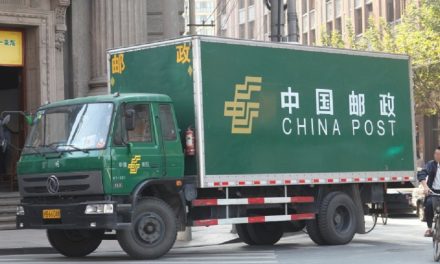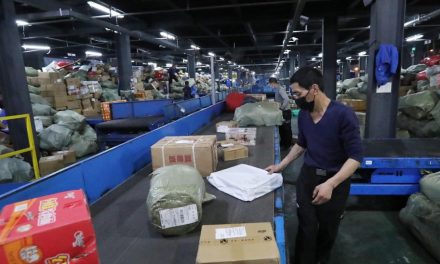
China Post Not Worried
Lured by the huge potential market of China, foreign and domestic delivery companies have been racing to get a bigger bite of the growing pie. UPS started direct flights to China in April, 12 years after it began operations in the country, becoming the second US express carrier after Federal Express (FedEx) to operate direct flights. UPS will operate six Boeing 747 flights a week between the two countries. The company served the China market through Hong Kong in co-operation with Sinotrans, its China-based partner, before being granted direct air rights by the US government in January. Grabbing about 5% of China’s express delivery market, UPS posted a 45% growth in 2000 over the previous year in its China business.
Deutsche Post World Net affiliate DHL plans to invest USD 9 million to build three more transfer stations in China, according to Andy Tseng, Area Director Greater China of
DHL International Hong Kong. The stations would enable DHL to expand its China network from 25 cities to 37 cities this year and to 50 cities next year with at least 160 offices.
FedEx is building a new express handling centre at Pudong that will integrate customs and delivery processes. David Cunningham, president of FedEx’s AsiaPacific division, said the
company will continue to increase its China network this year despite the possibility that the slowing US economy may shrink demand for high-value Asian goods. «China is the fastest growing economy within the FedEx network. It has huge potential,)> he said. FedEx, which serves about 190 Chinese cities, will add five this year, expanding to 290 cities within five years, he added.
Domestic deliveries
firmly in Chinese hands
However, the seemingly momentous moves by foreign express companies have not created much of a stir among local express delivery businesses, including express mail service (EMS)
operators under the loss-making State Postal Bureau (China Post). «Foreign companies are mainly engaged in international cargo delivery
services which are much more lucrative than local business, and that will not have much influence on our localised operation,» said Li Ming, marketing manager of Shanghai Homer Express Service Centre, one of the city’s hundreds of private
express delivery companies. On average, the 30 deliverymen in his company, using bicycles as their main means oftransport, handle 300 delivery orders which bring in at least 3,000 yuan (USD 360) daily, according to Li. «How can we survive? The reason is quite simple:
where there is a market demand, there is space for our existence,» Li said. «EMS still accounts for nearly 90% of Shanghai’s home delivery service,» said Cheng Ou, director of the public service department of Shanghai Post, the local operation of China Post. And the service still takes a 40% share of the local international delivery business even though it has encountered increasingly tough competition from foreign rivals like UPS and FedEx, Cheng said.
Cheng believes the figures refute some media reports which say foreign delivery companies pose a fatal threat to China Post. «It’s all misleading,» he countered. However, insiders say competition in the express delivery sector of China will surely become tougher in the coming years. “We can offer quicker and more flexible customer-oriented services than EMS,» Li said. For example, EMS centres have to collect a minimum number of packages before starting delivery because of the high operating costs. This is not satisfactory for many customers who expect immediate, citywide delivery. «Maybe what we are doing now is too trivial for EMS operators to care about,» Li said. For its part, China Post has intensified its efforts to upgrade its EMS service as it begins to feel sandwiched between foreign and domestic delivery companies.
New hubs, own aircraft and ships
Several days before UPS’ inaugural flight landed on April 3, China Post opened an airmail distribution centre in Shanghai as part of its plan to speed up EMS and give other express delivery providers a run for their money. Beginning July 1, China Post hopes to offer its EMS customers in provincial capitals overnight delivery services through five air routes linking Shanghai with Beijing, Chengdu, Qingdao, Xiamen and Guangzhou by renting five air freighters with a transport capacity of up to 20 tons each. According to company officials, the opening of the centre will free China Post from dependence on airlines and hence allow it to deliver mail more quickly. The bureau plans to launch another four lines linking the city with Wuhan, Shenyang, Shenzhen and Xi'an soon after the new service begins. To upgrade its delivery systems and provide a modem service, China Post has invested 50.7 billion yuan (USD 6.11 billion) in network construction and fixed assets over the past five years. It launched its own airline and shipping companies during that time with five planes and 11
Specialist express company
Shanghai Post is now stepping up efforts aimed at a better integrated network in order to provide local customers with improved delivery services.
A specialised express delivery company which targets local customers has been set up while the final technical adjustment for an on-demand-by-call service centre is under way. Shanghai Post will formally launch its improved express delivery services this month (May) with the promise to have packages within the Inner Ring Road areas delivered within one-and-a-half hours and packages outside those areas within four hours, according to Cheng.
Last year, the delivery time of China Post for regular mail was decreased. For letters, it was shortened by one day to a two-day delivery period, while the delivery time for parcels was shortened from four days to two. China now has more than 66,000 postal service sites that suffer an overall loss; of these, more than 50,000 are at the village or township level. In order to maintain the operation of these sites, China Post loses 3 billion yuan (USD 362.86 million) a year. According to government regulations, mail delivery is a monopoly run by postal companies. Other entities or individuals are not allowed to engage in the delivery of letters, postcards or other forms of mail unless there is a special government regulation or postal operating licence.
Fighting competition
Driven by profits, some domestic courier companies are broadening their op
erations into mail delivery services by violating government regulations. Their activities have led to market irregularity and have seriously hurt the normal operation of licensed postal firms. China Post investigated 200 courier companies in Beijing, Tianjin, Hebei and Shandong over a six-month period and found 80 of them had violated regulations. The business licences of 10 companies have been revoked. According to inspectors, some non-postal courier companies offer authorised door-to-door express mail services by illegally providing EMS envelopes. They deliver mail by passenger train and often change their place of business to avoid inspection.
Foreigners dominate
cross-strait service
In a related development, the Taipeibased Chunghwa Express Co has signed a cooperation agreement with the China Express Co to operate a cross-strait express parcel service. In the initial stage, a number of selected post offices will operate cross-strait express services, a Chunghwa official said. At present, the cross-strait express parcel service market is dominated by foreign companies, with DHL enjoying a 33.4% market share. UPS, Fedex, OCS and TNT have respective shares of 4.6%, 3.54%,2.3% and 1.15%.













